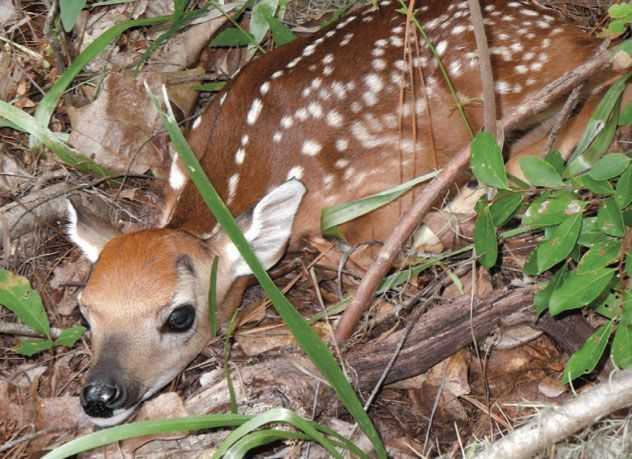Every year, the lives of many young wild animals are destroyed by well-meaning people who attempt to “rescue” them from the wild. This is especially true for white-tailed deer fawns, which are often left alone during the day while the mother is feeding nearby. According to the Alabama Department of Conservation and Natural Resources, this is a normal occurrence. “Does often leave fawns alone for extended periods of time,” said Wildlife Biologist Ray Metzler. “Fawns rely on their camouflage to avoid detection as they lay motionless on the forest floor because they are often unable to outrun predators at an early age. The doe will return to check on the fawn and nurse it, so human intervention is not necessary,” he said. Fawn laying down in grass, Metzler added, that deer and other wild animals need to learn how to fend for themselves, and this is an important part of their survival. “Taking animals from the wild prevents them from learning about natural enemies and other necessary survival skills,” he said.
Most wild mammals, including fawns, are protected under the law and may not be legally taken from the wild or kept as pets. In the vast majority of instances, fawns will be just fine if left alone. Fawns are difficult animals to rear in captivity and have the greatest chance for survival if left alone in their native habitat. Visit http://www.outdooralabama.com/hunting/contacts/wildlifesec.cfm to obtain contact information for the nearest district wildlife office if you have additional questions about fawn survival in Alabama.
Here are some facts about deer to keep in mind:
• Fawns are left in protective cover up until three weeks of age and the mother will return two to eight times per day to feed them. She may not return if you are within sight.
• If a fawn has been touched by humans, the doe will continue to care for it.
• A doe will accept a missing fawn for up to 48 hours.
• Fawns do not digest other animals’ milk well and may dehydrate quickly from diarrhea if fed cow’s milk.
• Fawns raised with only human contact can imprint on humans and become dangerous when sexually mature.
[easy-social-share]
